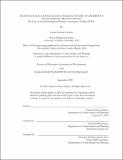| dc.contributor.advisor | Bish Sanyal. | en_US |
| dc.contributor.author | Ferreira Cardoso, Cauam. | en_US |
| dc.contributor.other | Massachusetts Institute of Technology. Department of Urban Studies and Planning. | en_US |
| dc.date.accessioned | 2021-01-05T23:13:09Z | |
| dc.date.available | 2021-01-05T23:13:09Z | |
| dc.date.copyright | 2020 | en_US |
| dc.date.issued | 2020 | en_US |
| dc.identifier.uri | https://hdl.handle.net/1721.1/129017 | |
| dc.description | Thesis: Ph. D. in International Development, Massachusetts Institute of Technology, Department of Urban Studies and Planning, September, 2020 | en_US |
| dc.description | Cataloged from student-submitted PDF of thesis. | en_US |
| dc.description | Includes bibliographical references (pages 277-291). | en_US |
| dc.description.abstract | Grassroots development organizations (GDOs) are defined by their hybrid identity as part social movement and part NGO. In the last decade, they have received renewed attention from the international development community due to their unique governance structure that, unlike their traditional NGO peers, empowered people living in poverty to organize and help themselves to achieve political and social welfare goals. With the large-scale adoption of information and communication technologies (ICTs) in developing countries, optimism over the feasibility of an inclusive, bottom-up development model grew even higher. In practice, however, only a handful of GDOs managed to generate impact at scale, and even among those who did, it remains unclear whether ICTs had a positive effect on their performance. | en_US |
| dc.description.abstract | As academics and policy makers search for the appropriate role of technological products and services to improve the lives of vulnerable populations, too many overlook the fact that GDOs, as organizations, endure their own process of adaptation to technological change. In this dissertation, I address this gap in the literature by developing an in-depth, mixed-methods case study of one of the world's most prominent GDOs, the Self-Employed Women Association of India (SEWA). Drawing from organizational theory, I assess the extent to which SEWA is influenced by the technologies it uses, and demonstrate that the operational gains produced ICTs can have the unintended effect of weakening a GDO's most important comparative advantage: their deep community ties and accountability to its members. At SEWA, ICTs facilitated transactional interactions at the expense of relational ones, making it easier to become a service provider and more difficult to sustain a social movement. | en_US |
| dc.description.abstract | They reinforced the type of accountability based on performance typical of market/client-provider relationships, but limited the quantity and quality of personal interactions that ultimately keep GDOs and its members connected through a common cause. Such findings have at least two implications for GDOs, and "bottom-up" development strategies more generally. First, technology is not a neutral input of development interventions but it rather influences people and organizations in different, often contradictory ways. Second, a narrow interpretation of ICTs' role in development obscures the fact that there is more to information and communications than their technological characteristics. The closer development organizations are from the people they serve, the more their work relies on iterative, context-specific relationships that are not always replicable through digital means. | en_US |
| dc.description.abstract | To engage with ICTs effectively, GDOs will be better served if they complement their technology upgrading efforts with proactive countervailing measures that promote a shared ideological, identity and collective goals. | en_US |
| dc.description.statementofresponsibility | by Cauam Ferreira Cardoso. | en_US |
| dc.format.extent | 291 pages | en_US |
| dc.language.iso | eng | en_US |
| dc.publisher | Massachusetts Institute of Technology | en_US |
| dc.rights | MIT theses may be protected by copyright. Please reuse MIT thesis content according to the MIT Libraries Permissions Policy, which is available through the URL provided. | en_US |
| dc.rights.uri | http://dspace.mit.edu/handle/1721.1/7582 | en_US |
| dc.subject | Urban Studies and Planning. | en_US |
| dc.title | Technological change & the changing nature of grassroots development organizations : the case of the Self-Employed Women's Association of India (SEWA) | en_US |
| dc.title.alternative | Technological change and the changing nature of grassroots development organizations | en_US |
| dc.type | Thesis | en_US |
| dc.description.degree | Ph. D. in International Development | en_US |
| dc.contributor.department | Massachusetts Institute of Technology. Department of Urban Studies and Planning | en_US |
| dc.identifier.oclc | 1227049004 | en_US |
| dc.description.collection | Ph.D.inInternationalDevelopment Massachusetts Institute of Technology, Department of Urban Studies and Planning | en_US |
| dspace.imported | 2021-01-05T23:13:08Z | en_US |
| mit.thesis.degree | Doctoral | en_US |
| mit.thesis.department | UrbStud | en_US |
